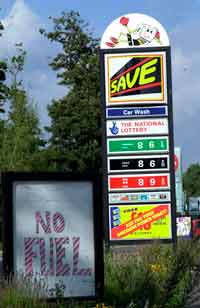Fuel prices still hurt 10 years on

Farmers and hauliers continue to be hit by high fuel prices – 10 years after protests brought Britain to a standstill.
Fuel prices have risen by 50% since fuel price protests blocked roads across the country during September 2000.
Motorists can expect to pay about 120p/litre at the pumps compared to 80p/litre a decade ago.
Prices are highest in the south of England and rural Scotland, according to the latest AA Fuel Price Report. And although petrol prices have fallen over recent weeks, they remain some 12p – or £6 a tank – higher than a year ago.
The UK has the seventh highest unleaded price in Europe and the second highest diesel price. Northern Ireland has the UK’s highest diesel price at 120p/litre. Yorkshire and Humberside have the cheapest diesel at 118.1p/litre.
AA spokesman Paul Watters said it was clear many drivers had had enough of higher prices. But it was difficult to forecast whether prices would go up or down, he added.
“With so much oil and wholesale price volatility, due to market speculators betting on changing economic indicators, predicting where prices will go is dangerous,” said Mr Watters.
The 2000 fuel protests began when farmers and hauliers blockaded the Stanlow oil refinery near Ellesmere Port, Cheshire, on 8 September 2000. The crisis quickly spread as other fuel terminals were blockaded.
About 3000 petrol stations were forced to close temporarily as forecourt supplies were halted and pumps ran dry.
The closures cost UK businesses an estimated £1bn. Eight days later protesters called off the blockades, saying they had made their point.
After the protest, the government announced it would freeze fuel duties, promising changes to the way goods vehicles were taxed, including the taxing of foreign vehicles operating on British roads.
Subsequent fuel price protests have had less impact. Demonstrations in 2005 resulted in some panic buying but protests in 2007 were not widely supported and caused little disruption.
Where are they now?
Brynle Williams
Fuel protest leader Brynle Williams has come a long way since the demonstrations and blockades a decade ago.
The livestock producer who keeps 70 suckler cows and 300 Lleyn sheep on the 80ha (200-acre) family farm in Cilcain, Flintshire, is now is now Tory shadow rural affairs minister and Welsh Assembly Member for North Wales.
Mr Williams has been quoted as saying he could “never see a fuel blockade happening again”. Instead, he now believes the best way of reducing prices is for the public to keep hammering the politicians.
David Handley
Dairy farmer David Handley played a key role negotiating between protesters and the government during the 2000 fuel crisis.
Chairman of Farmers For Action, Cornishman Mr Handley was prominent in protests that brought parts of central London to a standstill. He subsequently featured in a Channel 4 documentary about the blockades.
Mr Handley continues to lead Farmers For Action and campaign for a better deal for farmers. He farms with his wife in Monmouthshire, where the couple run the 130-head Govan herd of pedigree jersey cows.
Andrew Spence
Blockades in north-east England were led by Andrew Spence, a farmer and haulier from Consett, County Durham.
One of the most outspoken protestors, Mr Spence subsequently joined the British National Party. He polled 9% of the vote as parliamentary candidate for Sedgefield after prime minister Tony Blair stood down in 2007.
Despite coming fourth, the election result was the BNP’s best in its 25-year history. But Mr Spence left the party soon afterwards following a punch-up with a senior official, saying the BNP was “not what he thought”.
Is there a need for a fuel protest now?
What are fuel prices like in your area? Fill in the Farmers Weekly/NFU Inputs Price Monitor.
